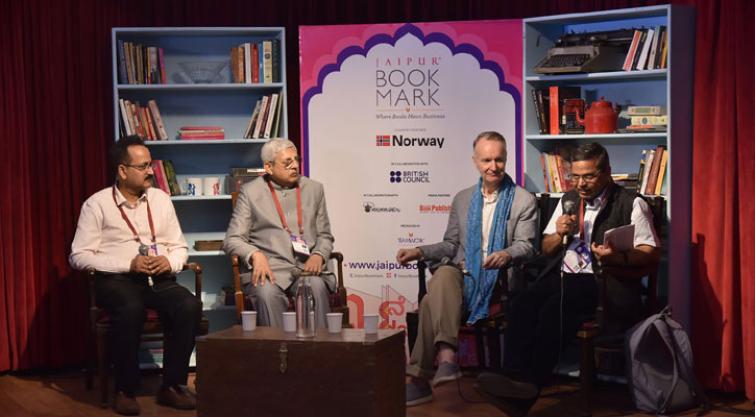By Fnf Correspondent | PUBLISHED: 02, Feb 2025, 12:21 pm IST | UPDATED: 02, Feb 2025, 12:30 pm IST

Jaipur: The 3rd day of Jaipur BookMark 2025, India’s premier publishing conclave, running concurrently with the Jaipur Literature Festival, hosted an array of insightful sessions.
One of the discussions, Roots and Wings: Stories that Travel and Stories that Stay Home, presented by The Royal Norwegian Embassy, explored the theme of what makes books resonate globally, featuring insights from publishers in Norway and France, Emmanuelle Collas and Jon Krog Pedersen. The speakers emphasized that women authors are gaining global recognition, with their works often centred on self-discovery. Meanwhile, culturally rich narratives are crossing borders, reinforcing Pedersen’s belief that “Its stories have to be local to be universal.”
In another insightful session, Telugu author Ravi Mantri, in conversation with Swetha Yerram, shared his deeply personal journey of writing Amma Diary Lo Konni Pageelu, a heartfelt tale of lost love, second chances, and the unbreakable bonds of family. Mantri shared his struggles in getting the book published, recalling his frustration when a publisher rejected it simply because of its unconventional title. He recounted how he began thinking like Sarika, the protagonist, after facing scepticism about why a son, rather than a mother, had written the story. The book, originally intended for a niche audience with just 200 copies, experienced an overwhelming response, selling 1,000 copies in just two days in May 2024. Written in pure Telugu, the story carries a strong regional essence. Mantri also encouraged aspiring writers to write fearlessly, without seeking validation, emphasizing that stories should come from the heart rather than the need for external appreciation.
The session Literary Agents: Pithy Pitches and Creative Contracts, brought together India’s most popular literary agents: Jayapriya Vasudevan, Kanishka Gupta, and Mita Kapur in conversation with Ranjana Sengupta. It examined the pivotal role of literary agents in shaping the careers of authors. Vasudevan, founder of Jacaranda Literary Agency, addressed the challenges of operating in India, including freedom of speech concerns that led her to establish her agency in Singapore. Gupta shared how she built trust with publishers without a traditional background, while Mita Kapur emphasized the need for having long term relationships with authors that go beyond business ties. The discussion covered challenges like translation issues and changing author-publisher dynamics. Kapur concluded with advice for aspiring writers, highlighting the importance of patience, research, and professionalism in publishing.
In Thrills and Chills: Publishing and Marketing Thrillers, the session began with a thoughtful discussion surrounding their paths to becoming thriller authors, a genre where South Asian writing is underrepresented. Vikas Swarup, the former High Commissioner of India to Canada and fan of thriller novels, mentioned that the lack of Indian authors in the genre is why he chose to write. When asked about inspiration for new novels, all the author agreed that curiosity is crucial to writing engaging stories, with Ram Murali stating that he “finds everything interesting”. Pandey described that his best technique for writing new novels is to only write stories that make sense to him. The conversation explored more serious topics as well, such as the decrease in Hindi book libraries in northern India.
Literary magazines serve as a crucial incubator for emerging writers, providing a platform for fresh talent and innovative storytelling. The session Literary Magazines: A Writer’s Nursery, with Andrew O’Hagan, Ashok Maheshwari, and Jai Prakash Pandey, in conversation with Aishwarj Kumar, reflected on the evolution of literary magazines over the years and how they continue to nurture a new generation of writers, offering them exposure and validation in an increasingly competitive industry. The panel discussed the important role of literary magazines in nurturing writers and readers. The speakers concluded the discussion by highlighting the challenges, including online publishing's impact on traditional bookstores, regional language differences in publishing, and social media's effect on classical literature readership.
The day ended with The Editor’s Roundtable that brought together key industry professionals, Amrita Talwar, Chiragh Thakkar, Elizabeth Kuruvilla, Karthika VK, Manoj Satti, Moutushi Mukherjee, Rahul Dixit, and Sushant Jha in conversation with Arunava Sinha to discuss decision-making processes within publishing houses. Discussions ranged from the marginalisation of genres like plays and poetry to the growing influence of sales figures in editorial decisions. The editors provided insights into balancing artistic integrity with commercial viability, a challenge that continues to shape the publishing landscape.
Jaipur BookMark 2025, now in its 12th year, reaffirms its status as a premier space for literary exchange, fostering collaboration and innovation in the publishing industry. With a focus on storytelling that transcends borders, the conclave continues to spotlight the diverse voices shaping contemporary literature.

by : Priti Prakash
The issue of deportation of Indian migrants staying illegally in the US took an emotionally charged ...